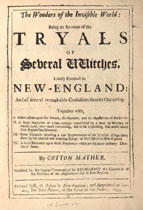 Between the years 1692-1693, several people were brought to trial in colonial Massachusetts for their involvement in witchcraft. The mass hysteria began when Elizabeth Parris, the nine year old daughter of Reverend Samuel Parris began to have fits. Her cousin and Reverend Parris’ niece Abigail Williams, an eleven year old girl, also exhibited similar symptoms. When these episodes occurred, the girls screamed and behaved abnormally. Likewise, another girl named Ann Putnam exhibited the same symptoms.
Between the years 1692-1693, several people were brought to trial in colonial Massachusetts for their involvement in witchcraft. The mass hysteria began when Elizabeth Parris, the nine year old daughter of Reverend Samuel Parris began to have fits. Her cousin and Reverend Parris’ niece Abigail Williams, an eleven year old girl, also exhibited similar symptoms. When these episodes occurred, the girls screamed and behaved abnormally. Likewise, another girl named Ann Putnam exhibited the same symptoms.
When they were questioned by the magistrates, they accused three women in the village – Sarah Osborne, Tituba (Parris’ slave) and Sarah Good – of practicing witchcraft which caused their abnormal behavior. All the three accused were questioned by local magistrates. Although both Sarah Osborne and Sarah Good denied practicing witchcraft, Tituba confessed. All three were imprisoned after the interrogation. Soon, this was followed by a series of witchcraft accusations and trials in which more than two hundred people were accused and twenty were executed. Later, in 1693, the colonial town of Salem acknowledged that these trials were an error.
Curious to learn about the historical background of these witch trials? Check out the five-part documentary on the subject available on YouTube – Part 1, Part 2, Part 3, Part 4, and Part 5. We also have The Crucible, which you can either read or watch.
If you would like to research the topic, we have several books that deal with the history of this incident. Particularly interested in the trials? Do a subject search in the Catalyst for our holdings. You can also limit the search by years to locate some digital primary sources. A good reference resource to consult would be The Salem Witch Trials: A Reference Guide. The George Peabody Library has the Records of Salem Witchcraft Copied from the Original Documents which would be interesting to read. I also recommend checking out the Salem Witch Trials project from the University of Virginia and the Salem Witchcraft Trials 1692 collection from the University of Missouri-Kansas City.
